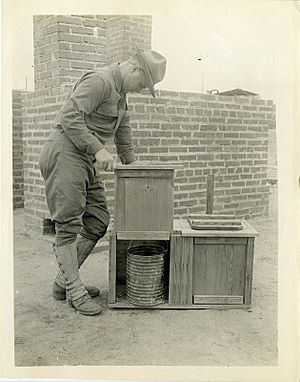Latrine facts for kids
A latrine is a basic kind of toilet or a simple place used for going to the bathroom. It's an important part of keeping places clean and healthy, especially where there aren't modern plumbing systems. Latrines can be as simple as a trench dug in the ground, a hole (called a pit latrine), or even more advanced designs that use a small amount of water to flush. They are often used in camps, during emergencies, or in places without complex water and sewage systems.
Contents
What is a Latrine?
A latrine is a very simple way to manage human waste. It helps keep the environment clean and stops the spread of germs. Unlike modern toilets that use a lot of water and connect to sewage pipes, latrines are often built using local materials and simpler methods. They are a key part of sanitation, which means keeping things clean to protect health.
Types of Latrines
There are many different kinds of latrines, from very basic to more complex ones.
Pit Latrines
A pit latrine is one of the most common types. It's basically a deep hole dug in the ground. A small building or shelter is usually built over the hole for privacy. When the pit gets full, it is covered with earth, and a new pit is dug nearby. These are often found in rural areas or temporary camps.
Trench Latrines
During events like wars or large outdoor gatherings, people might use trench latrines. These are long, shallow ditches dug in the ground. They are a quick and easy solution for many people to use at once, but they are usually temporary.
Pour-Flush Latrines
Some latrines are more advanced, like pour-flush systems. These have a pan or bowl, similar to a modern toilet. After using it, a small amount of water is poured in to flush the waste into a pit or tank. This type is cleaner and helps reduce smells and insects.
Why Latrines are Important
Latrines play a very important role in public health, especially in areas where modern plumbing is not available.
Stopping Germs
When human waste is not properly managed, it can spread diseases. Germs from waste can get into water sources, food, or directly infect people. Latrines help to safely contain waste, preventing these germs from spreading. This protects people from illnesses like cholera and typhoid.
Keeping Communities Healthy
Having clean and safe places to go to the bathroom is vital for any community. Latrines provide a dignified and hygienic solution. They are especially important in schools, refugee camps, and areas recovering from natural disasters. By improving sanitation, latrines help keep entire communities healthier and safer.
History of Latrines
People have been using different forms of latrines for thousands of years. Before modern plumbing, various simple systems were used to manage waste.
Ancient Latrines
Ancient civilizations, like the Roman Empire, had public latrines. These were often long benches with holes, where many people would sit together. They usually had water flowing underneath to carry away the waste. These ancient systems show that people have always understood the need for organized ways to deal with waste.
Latrines in War and Camps
Throughout history, especially during wars, armies have relied on latrines. Simple trench latrines were common in places like the 1st World War. They were essential for keeping soldiers healthy in crowded camp conditions. Today, latrines are still crucial in refugee camps and disaster zones, providing basic sanitation when infrastructure is damaged or missing.
Images for kids
-
Roman public latrine found in the excavations of Ostia Antica; unlike modern installations, the Romans saw no need to provide privacy for individual users.
-
Public Latrine at Athens' Roman Forum site.
-
Roman latrines in Els Munts villa at Altafulla in Tarragonès, Spain. 1) Bench 2) Main water channel 3) Front water channel 6) Divider 7) Washbasin
-
Latrines of Krak des Chevaliers in Syria
See also
 In Spanish: Letrina para niños
In Spanish: Letrina para niños
 | Selma Burke |
 | Pauline Powell Burns |
 | Frederick J. Brown |
 | Robert Blackburn |






